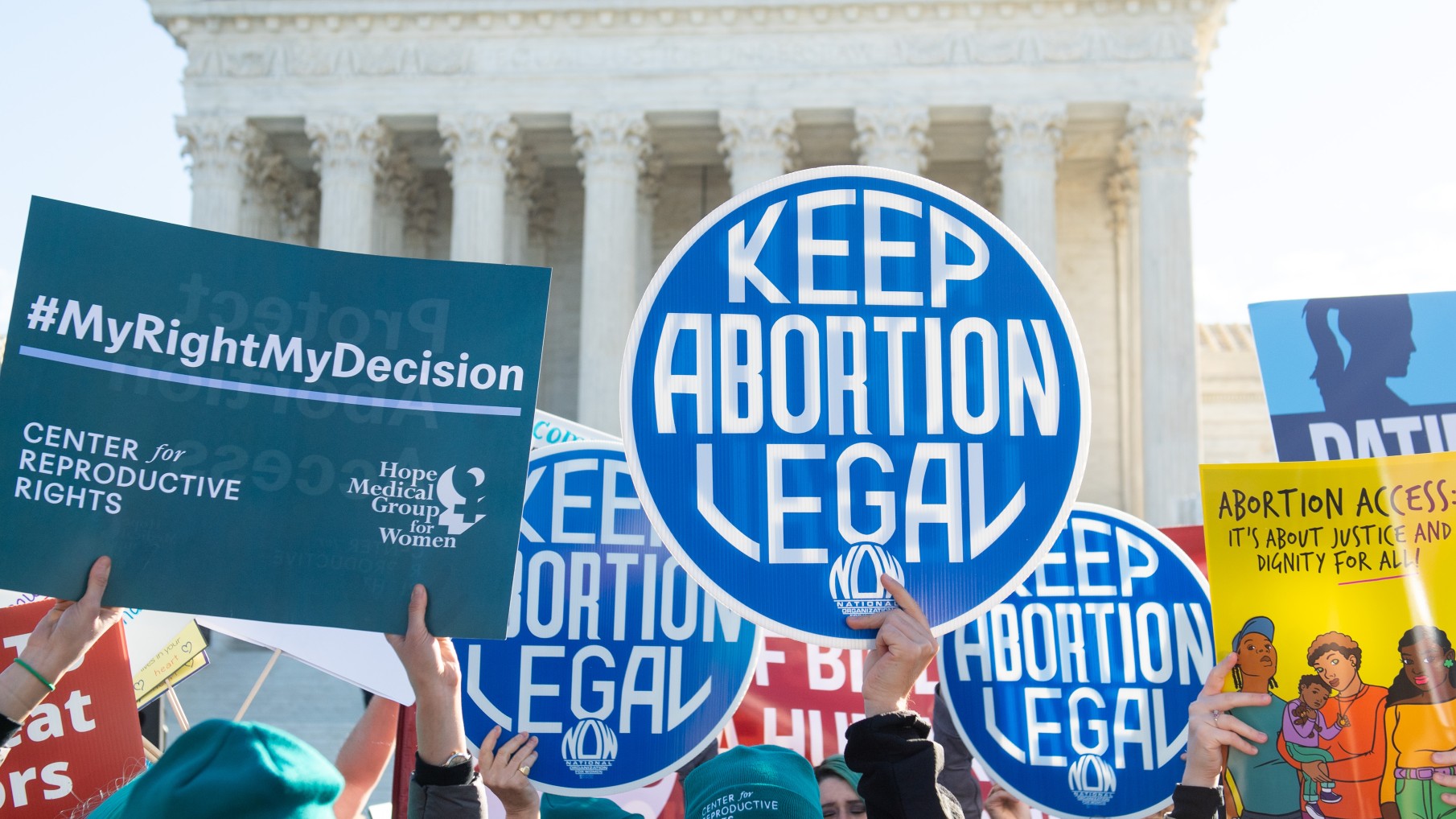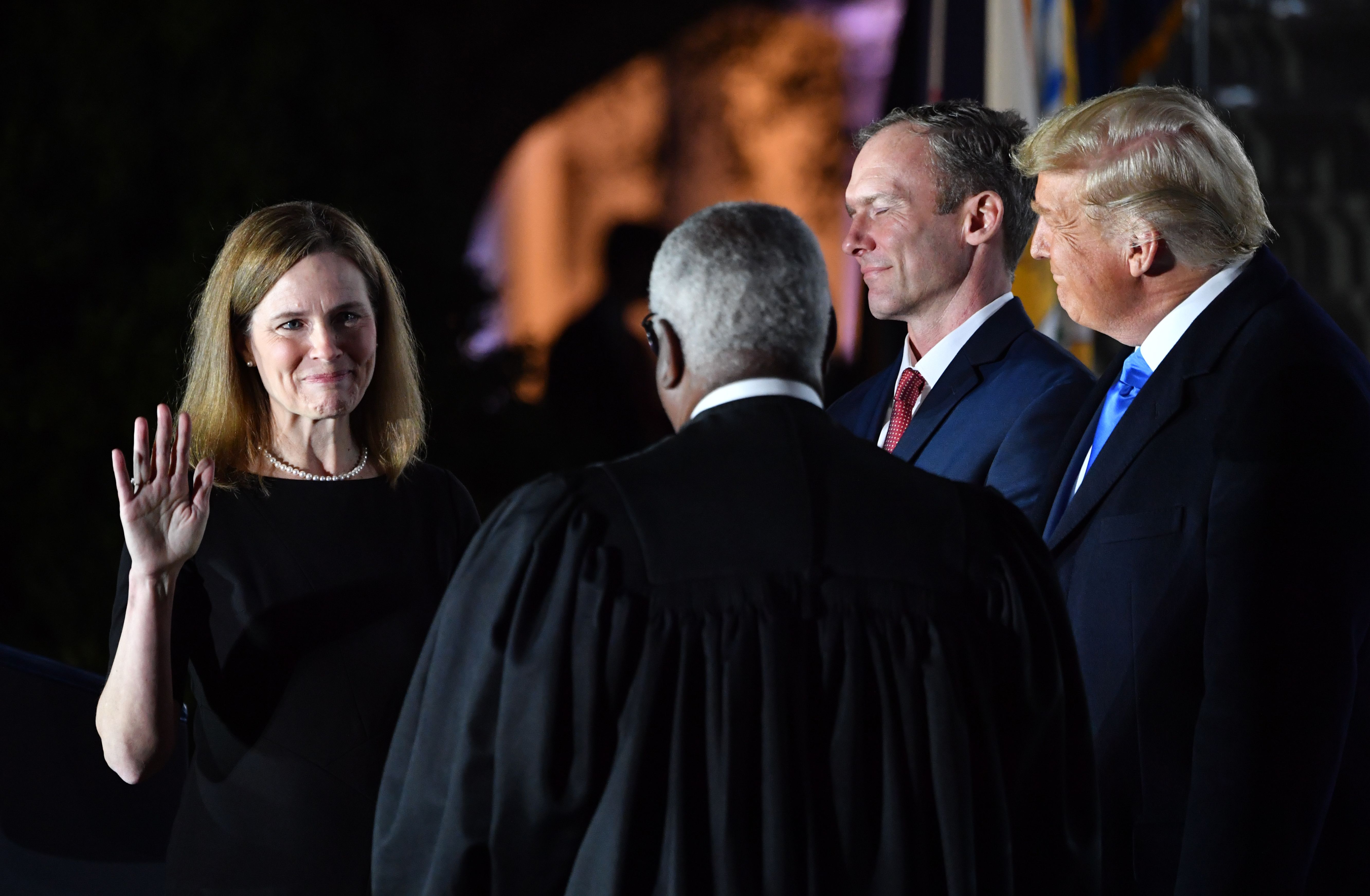The Supreme Court Is Hearing Arguments in a Case That Could Overturn 'Roe v. Wade'
'Dobbs v. Jackson Women's Health Organization' is the most consequential abortion rights case in decades. Here's what you need to know.


The battle for reproductive freedom continues today as the Supreme Court hears oral arguments in a case known as Dobbs v. Jackson Women's Health Organization that directly challenges Roe v. Wade. It's the first time the Supreme Court will rule on the constitutionality of a pre-viability (a.k.a. before the fetus can survive outside of the uterus) abortion ban since Roe became the law of the land nearly 50 years ago.
Reproductive justice advocates were surprised to learn in May that the Supreme Court would take up the case, which involves a Mississippi law passed in 2018 that bans abortion after 15 weeks. In 2019, the Mississippi abortion ban was struck down by lower courts and stopped from going into effect. Following this, Thomas Dobbs, state health officer of the Mississippi Department of Health, filed an appeal on behalf of the state requesting for the Court to uphold the 15-week ban and directly overturn Roe. The Court sat on the case for nearly a year before it decided to hear it.
"It's important to pay close attention to what happens in the oral arguments on Wednesday and how this gets spun by the states and by our opposition while we're waiting for the outcome," explains NARAL President Mini Timmaraju. "The anti-choice advocates are going to use the fact that the Court opened this window to hear this case and have let S.B.8, [the recent Texas law that bans abortions after six weeks], stand so long as more incentive to push further restrictions on abortion across the country."
The Center for Reproductive Rights will represent Jackson Women's Health Organization—the only licensed abortion clinic left in Mississippi—as the Supreme Court decides whether or not all pre-viability bans on elective abortions are unconstitutional. Jenny Ma, senior staff attorney at the Center for Reproductive Rights, tells Marie Claire that the simplest decision, and the option the Center is advocating for, would be that the Court recognizes Roe is the law of the land and reaffirms that decision like it did in Planned Parenthood v. Casey in 1992.
It's really important to understand that any decision that upholds Mississippi's ban is the same as overturning 'Roe.'
On the other end of the spectrum, in a devastating blow to abortion rights, the Court can accept Mississippi's arguments and overturn Roe v. Wade as well as Planned Parenthood v. Casey. In this scenario, the constitutional right to have an abortion would effectively be eliminated in about 26 states (12 of them have trigger laws that are waiting to go into effect if and when Roe is overturned). However, what it really comes down to is the details. The Court could decide not to explicitly uphold Mississippi's ban or overturn Roe. Instead, it could redefine provisions like the viability standard (fetal viability typically occurs around 24 weeks of pregnancy), which the state of Mississippi argues is arbitrary.
"It's really important to understand that any decision that upholds Mississippi's ban is the same as overturning Roe," says Ma. "They might not say the words in the decision, but you cannot uphold this law without taking away the core holding of Roe, which is that the individual has the right to make the decision until viability."
Nearly six in 10 Americans support legal abortion and do not want Roe v. Wade overturned, yet 2021 has been the worst year on record for abortion access—with low income people of color, LGBTQ+ folks, and those who live in rural areas disproportionately impacted the most. At this critical time, pro-choice advocates are focused on electing pro-choice politicians in the 2022 midterm elections and passing the Women's Health Protection Act (WHPA). The bill would codify Roe and expand abortion access across the country by making it harder for states to pass medically unnecessary restrictions like waiting periods and telemedicine bans. It passed in the House and is currently sitting in the Senate.
Get exclusive access to fashion and beauty trends, hot-off-the-press celebrity news, and more.

Justice Amy Coney Barrett, who was appointed by former President Donald Trump, is sworn in by Justice Clarence Thomas on October 26, 2020—just over a month after Justice Ruth Bader Ginsburg passed away.
As oral arguments commence, the Supreme Court's 6-3 conservative majority is a major concern for abortion rights advocates. Three of the justices—Neil Gorsuch, Brett Kavanaugh, and Amy Coney Barrett—were appointed by former President Donald Trump who previously promised to appoint Supreme Court justices that would overturn Roe v. Wade. These justices, as well as Clarence Thomas and Samuel Alito, recently voted not to block Texas' six-week abortion ban from going into effect on September 1. This morning, hundreds are rallying in front of the Supreme Court in hopes that their reproductive freedom will be protected.
"Our generation has just not been through this, and so I think in some ways the [abortion] rights have been expected," says Ma. "For pregnant people and women, it's just devastating to see these arguments being made."
The Court is expected to issue a decision on Dobbs v. Jackson Women's Health Organization in summer 2022, though it could technically do so anytime beginning in January. You can listen to the oral arguments starting at 10 a.m. ET.
Rachel Epstein is a writer, editor, and content strategist based in New York City. Most recently, she was the Managing Editor at Coveteur, where she oversaw the site’s day-to-day editorial operations. Previously, she was an editor at Marie Claire, where she wrote and edited culture, politics, and lifestyle stories ranging from op-eds to profiles to ambitious packages. She also launched and managed the site’s virtual book club, #ReadWithMC. Offline, she’s likely watching a Heat game or finding a new coffee shop.
